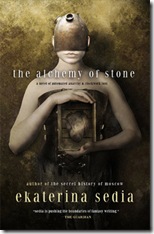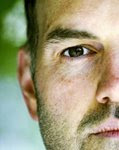
Well Kathy, it's all go for you isn't it, what with rave reviews of The Secret History of Moscow and Paper Cities adorning the net, you must be over the moon!
1. What are you up to at the moment, writing and editing wise?
Well, at the moment I am editing Russian Winters – an anthology of fantasy stories rooted in Russian myth for Prime. There are also a couple of editing projects very much in the proposal stage, so I feel it's a bit early to talk about them.
Writing-wise, I have finished my third book for Prime, The House of Discarded Dreams, and am currently working on a YA book. There are a few other things in various stages of development kicking around, and my amazing agent is working hard looking for a publisher for my next book.
Sounds exciting!
You've actually lead me on to a question I wanted to ask someone in your position, which is regarding being a writer who edits (or an editor who writes).
2. I've been told that writers shouldn't edit and editors shouldn't write. What's your opinion?
Obviously, I disagree; at least, I disagree with it as a universal statement. I think it can create a situation where there is a conflict of interest -- for example, an editor inserting a story into an anthology they edit, and that should be avoided (again, there are exceptions). Other than that, I see no particular reason not to put together a book of stories by writers I enjoy and finding a publisher. Writing and editing definitely appeal to different interests, and I am not sure why shouldn't I be allowed to enjoy both.
3. As you know I've read The Secret History of Moscow and loved it (and still have a review that needs polishing). How much research went into that in terms of the mythology/history and how did you come up with the idea?
Not a whole lot of research -- I needed to verify some of the dates, but otherwise I tried to rely on history and folklore generally familiar to Muscovites of my generation (Zemun the Celestial Cow possibly being an exception) -- something we all learned in our history classes and movies based on folktales. The book is largely a riff on the familiar cultural and historical background and the underside of this background. I've always been fascinated with secret histories and hidden realities, so this book was my attempt to poke in the cracks between background reality and understanding of history, and see what crawls out.
4. What do you do when you're not writing (or editing)?
I do work full-time (more than full time, if you consider that I teach at a liberal arts college -- in addition to a heavy teaching load, I do research, so it all adds up to long long hours. In my free time, I garden, cook, occasionally work out or watch movies. Nothing earth-shaking there.
5. Have you any tips for aspiring writers (and indeed editors) who may be reading this?
All advice should help you achieve your goals, so having goals that depend on oneself rather than some outside agency is always good. One piece of advice I found helpful (and I have to credit Jay Lake, who's been a wonderful friend and a greatly supportive influence for it) was "Write more" -- because really, this is something we all can do, and more writing leads to better writing. Another bit of advice is to evaluate all advice given -- there are so many writer-oriented websites, books, blogs, that there is too much advice out there. Most of it applies in certain circumstances or to certain people but not others. Like writing everyday -- great for some, terrible for others. Or avoid adverbs at all cost -- another thing that can be useful in some situations (overused dialog tags, for example) and just horrible in others. Basically, find things that work for you and discard the rest.
As for the editors -- I would say that all editors (and I am including myself in this group) should strive to attract more writers from underrepresented groups -- such as women in science fiction, or writers of color in most of speculative fiction genres (this is, of course, meant to apply to the US). Seek to expand your tastes beyond things you used to love when you were twelve.
And for both writers and editors -- read outside of your chosen genre as well as within it. Good writing is universal.
Lots of good information there, Kathy, thanks for that!
6. Is music a big part of your writing and editing work? Are you a keen listener, are you inspired by music, or do you prefer quiet and solitude?
I do enjoy quiet and solitude, but music is often helpful for creating atmosphere. I do tend toward dark music -- Tom Waits and Nick Cave are my go-to dark musicians. I also do enjoy The Pogues and Clash a lot -- I've been listening to a lot of both lately, while working on my YA book. In any case, music is usually the background, not the inspiration (and that is a good thing, considering.)
Oh my, what fine taste in music you have grandma... I mean Kathy...
7. Who inspired you to write and who is inspiring you to keep writing?
There are plenty writers I admire, but I would not say that any one of them inspired me to write. Writing, IMO, occurs when one feels one has something to say, and should stop when I has said everything one wanted to say.
I like the very vague answers to this question recently... although I do agree with your point.
8. What do you think there needs to be more of in the spec fic industry, specifically within the independent press area?
Good books. More good books. Independent press is positioned to take advantage of many niche markets today, so I would think that it would make sense to publish less mainstream boy's own adventure and paranormal romances where everyone is white and independently wealthy, and focus instead on speculative fiction that is not as widely represented -- fiction by and about ethnic minorities, women, cultures other than Western and so on. We need books about future where not everyone is middle class, we need epic fantasy set outside of what K. Tempest Bradford termed 'McEurope' in her recent Fantasy Magazine article. More different voices, more voices that have not been heard before.
*nods*
9. What is it that draws you into speculative fiction, why are you working in this area?
I think (good) speculative fiction is about the same things as mainstream fiction; spec fiction allows one to explore the same concerns people share in different situations, contrived settings and plain fun tropes. There's just so much realism one can take.Personally, I like writing about characters who are not-quite-human, and take known histories and look for potential weirdness – alternate history appeals to me a lot for that reason. At the same time, speculative fiction allows one to talk about myths and their influence on people as something other than a metaphor -- you can take the fantastic and incorporate it into a normal life; in a way, it is an attempt (at least occasionally) to reconstruct magical outlook of many human societies to who the distinction between the realistic and the fantastic was not necessarily obvious or even real.
10. Last but not least, In terms of the short fiction you write, when sending it away do you look for a particular theme of an anthology, or do you prefer certain editors or do you even care?
Specifically for anthologies -- it all depends. Sometimes a theme might appeal to me, or sometimes the editor or the publisher. Of course, I usually try to honor invitations if at all possible. Another thing I look for are paying markets -- not really a mercenary consideration, but the ability and the desire to pay writers tells me whether the company has the means to get my work seen, and just generally if they respect the writers enough to pay them.
Same is true of magazines, even though there I go more by reputation and their list of contributors. Lone Star Stories and Farrago's Wainscot, for example, pay a token amount but published an excellent list of contributors, so I was proud to appear in both. Overall, I think, I go for the publications I like.
Thank you so much Kathy, for agreeing to come along for the interview. I wish you continued success with The Secret History of Moscow and Paper Cities and I hope the new books do even better!

No comments:
Post a Comment